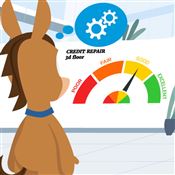How to Remove Inquiries From Your Credit Report
Have too many inquiries and your credit score goes down. In this guide, learn how to remove them from your credit report.
 |
Yes, you can remove inquiries that affect your credit. Here's how:
One inquiry won't dent your credit score too much. But what happens if you accumulate more inquiries in your credit reports?
They can drag down your credit score, hindering lenders from being confident about offering you loans.
But that doesn't mean you can't do anything about it. In this guide, learn the different types of inquiries and steps to remove them from your credit reports.
How To Remove Hard Inquiries
Hard inquiries can stay on your credit reports for up to two years.[1] Your potential creditors and lenders in the future can see these entries, too. This is how you remove them.
Get Your Credit Reports
First, you'll need to get the latest copies of your credit reports from the three credit bureaus: Experian, Equifax, and TransUnion.
It's a good thing you can request digital copies of your free credit reports from AnnualCreditReport.com.
Review Inquiries
It's time to recall all your credit card or loan applications. And the times you signed up for services and apps that require pulling your credit reports. Then watch out for the three items below.
- Unauthorized inquiries
See inquiries you don't remember making? You should only get legitimate hard inquiries from creditors you've authorized to access your credit profile.Watch out for hard inquiries from credit card applications you didn't make or loans you didn't sign up for. Fraudulent credit activities and identity theft are rampant — adding negative items to your credit reports without you knowing.
- Outdated inquiries
Review the dates of your inquiries and note those that are too old. Inquiries can stay on your credit report for as long as 2 years. After that, it should fall off your credit report. - Inaccurate inquiries
Sometimes, there's inaccurate information in your inquiry entries. Or there's a chance that a double entry of the same inquiry may occur. You can dispute these types of mistakes on your credit reports.
A hard inquiry can reduce your credit score by up to 10 points. The more hard inquiries you have, the more your credit score can decrease. Also, note that if you have plenty of hard inquiries in your credit reports, it can affect the decision of lenders to loan you money.
Verify Inquiries With Creditors
Before you dispute the credit bureaus, contact your creditors first. If the hard inquiry contains errors or results from fraudulent activities, you can request your creditors to remove it.
Attach a copy of your credit report to show the entry. You can also add supporting documents to verify your claims and hasten the removal of the inquiry on your credit report.
Send Dispute Letters To Credit Bureaus
Creditors won't remove the inquiries? You can dispute outdated, erroneous, or fraudulent inquiries to the credit bureaus.
Send your dispute letter to Equifax, Experian, and TransUnion. Make sure to add all supporting and necessary documents.
[Date]
[Credit bureau]
[Credit bureau's address]
Re: [(Creditor who made the inquiry) Inquiry]
Dear [Credit bureau],
Thank you for taking the time to read my letter. I recently reviewed my credit reports and discovered that I have an inquiry from [Creditor] reported on [date item was reported].
I humbly ask you to remove it because [reason for removal, like: it was an inquiry made more than two years ago/I didn't authorize (creditor) to make a hard inquiry to my credit/the inquiry was reported twice].
I'm hoping to [state what you will do: apply for a loan/credit card, refinance mortgage, consolidate other debts, etc]. My recent hard credit inquiries may disqualify me.
I'm hoping you can consider this removal request for my [inaccurate/outdated/unauthorized] inquiry.
I'm hoping for your understanding, consideration and timely response.
Kind regards,
[Your name]
[Your address]
You can file disputes online by visiting the dedicated pages for dispute submissions:
If you opt to send your dispute letters by mail, you can send them to the following address of each credit bureau.
| Equifax[2] | Equifax Information Services, LLC P.O. Box 740256 Atlanta, GA 30374-0256 |
|---|---|
| Experian[3] | Experian P.O. Box 4500 Allen, TX 75013 |
| TransUnion[4] | TransUnion Consumer Solutions P.O. Box 2000 Chester, PA 19016-2000 |
Consider Credit Monitoring Services
It may take up to 50 days to see results from your dispute letters. Credit bureaus have 30 days to investigate your dispute, and they get an additional 15 days if you send more supporting documents for your claim.[5]
Credit bureaus have five business days to inform you of the results.
Once you get the results, consider signing up for a credit monitoring service like Credit Karma. That way, you can get real-time updates on any inquiry and prevent fraudulent activities that tarnish your credit.
Now that you know the steps, here are some points to remember about inquiries to your credit reports.
What is an Inquiry?
An inquiry is a request to check your credit profile. When you apply for a loan or credit card or sign up for a financial app or service, your creditor may perform a credit check to assess you.
Two types of inquiry can show up on your credit report: hard inquiry or soft inquiry. Only hard inquiries affect your credit scores.
Hard Inquiry vs. Soft Inquiry
A hard inquiry means creditors accessed your credit profile for loan-related decisions. This usually occurs when you apply for new credit cards, lines of credit, or loans.
Meanwhile, a soft inquiry means creditors accessed your credit profile for general information. This means your creditors pulled your credit for purposes unrelated to loans. Soft inquiries are only visible to you.
No, it is not illegal to remove inquiries. The Fair Credit Reporting Act protects you and gives you the right to dispute entries in your credit reports.[6] If you spot an inquiry that isn't yours or see specific inquiries from creditors you don't know, you have the right to dispute it for removal.
Why do I have hard inquiries on my credit report?
You may gain hard inquiries on your credit reports for several reasons, like:
- Credit card applications
Most financial institutions perform hard inquiries when you apply for a new credit card — to assess your creditworthiness and ensure you can pay back what you owe. - Home or auto loan
Applying for a mortgage or auto loan triggers a hard inquiry. If you shop around for favorable rates, all inquiries made within 14–45 days of each other are counted as one inquiry.[7] - Credit limit increase
You can ask your bank or credit card issuer for a credit limit increase. Some may perform a hard inquiry before granting your new limit, while others will only do a soft credit check. - Credit check for employment
Due to the nature of the job, some positions require a credit check to assess past financial mismanagement and excessive debt. Some use your credit reports to verify information. - Identity theft
Unauthorized credit inquiries can result from fraud. Individuals may use your information to apply for new loans or new credit cards without your knowledge. Stay vigilant!
Does Removing Inquiries Increase Your Credit Score?
Yes, removing inquiries can increase your credit score. Each hard inquiry can knock off up to 10 points from your credit score.
That's why it is strongly recommended not to simultaneously apply for loans, credit lines, and credit cards.
To remove an inquiry quickly, file a dispute with the credit bureaus. They may take up to 50 days to investigate and remove inaccurate, outdated or fraudulent inquiries. However, if your inquiries are legitimate, they will remain on your credit reports for up to 2 years from the date it was made.
How Many Hard Inquiries Are Ok?
The impact of hard inquiries depends on the lenders or creditors. The rule of thumb is that 6 inquiries in your credit report at one given time can impact your application for loans and credit cards.
These inquiries can stay on your credit reports for up to 2 years.
How to Prevent Unauthorized Hard Inquiries
Unauthorized hard inquiries impact your credit score and financial health. But you can avoid these circumstances from happening with some proactive measures.
- Review your credit reports regularly
Routinely check your credit reports to uncover any new inquiries. You won't be aware of new changes unless you actively monitor your credit reports. - Monitor your credit score
Hard credit inquiries can drop your score by up to 10 points. If this happens, review your credit reports or alerts to spot any new inquiries impacting your credit score. - Use credit monitoring apps
Credit monitoring apps, such as LifeLock, Privacy Guard, and ID Watchdog, can help you keep track of your recent credit changes. It may be worthwhile to have one! - Place a credit freeze
Request a credit freeze from the three credit bureaus to block access to your credit reports. This stops creditors, lenders, and unauthorized individuals from making inquiries until you lift the freeze. Don't forget to freeze all your credit reports. - Be vigilant with your personal information
Scams and identity theft are rampant and add unknown inquiries to your credit, greatly impacting your credit score. Be cautious when sharing information.
You might notice unauthorized creditors or more inquiries than you remember. Loan brokers or auto dealers often submit multiple applications to find you the best deals, adding more inquiries to your credit reports. Contact your creditor immediately to clarify!
Tips For Improving Your Credit Score
Sometimes, it may make more sense to build a better credit history before applying for new loans and credit cards. This can show creditors and lenders your ability to pay back what you owe.
Here are some good practices you can apply:
- Pay on time
If you have other loans and debts, pay them on time! This way, you avoid getting late payments and having them sent to collections. Potential lenders will see that you can afford the loan you are applying for. - Use credit builders
Credit builders and credit builder loans can help build many positive items in your credit report. Some credit builders cost around $10/month. - Dispute other negative items
If other inaccurate items (apart from fraudulent inquiries) continue to affect your credit score, you need to dispute these items. Several companies have decades of experience handling creditors and credit bureaus to remove these items.
Bottom Line
Inquiries can negatively affect your credit, especially erroneous ones or those made in your name without your knowledge.
Try disputing with your creditors first to remove the inquiries. If unsuccessful, you can escalate the dispute to the credit bureaus.
Ideally, you only have a few inquiries in your credit reports. This shows potential creditors that you aren't applying for many credit cards, loans, and credit lines at the same time.
References
- ^ TransUnion. Disputes and Credit Inquiries, Retrieved 01/16/2025
- ^ Equifax. FAQ: How do I correct or dispute inaccuracies on my credit reports by mail?, Retrieved 01/16/2025
- ^ Experian. How to Dispute Credit Report Information, Retrieved 01/16/2025
- ^ TransUnion. Dispute your credit report by mail or phone, Retrieved 01/16/2025
- ^ CFPB. If a credit reporting error is corrected, how long will it take before I find out the results?, Retrieved 01/16/2025
- ^ Federal Trade Commission. Fair Credit Reporting Act, Retrieved 01/16/2025
- ^ Consumfer Financial Protection Bureau. How will shopping for an auto loan affect my credit?, Retrieved 01/16/2025
Write to Alex Mambaje at feedback@creditdonkey.com. Follow us on Twitter and Facebook for our latest posts.
Note: This website is made possible through financial relationships with some of the products and services mentioned on this site. We may receive compensation if you shop through links in our content. You do not have to use our links, but you help support CreditDonkey if you do.
|
|
| ||||||
|
|
|








